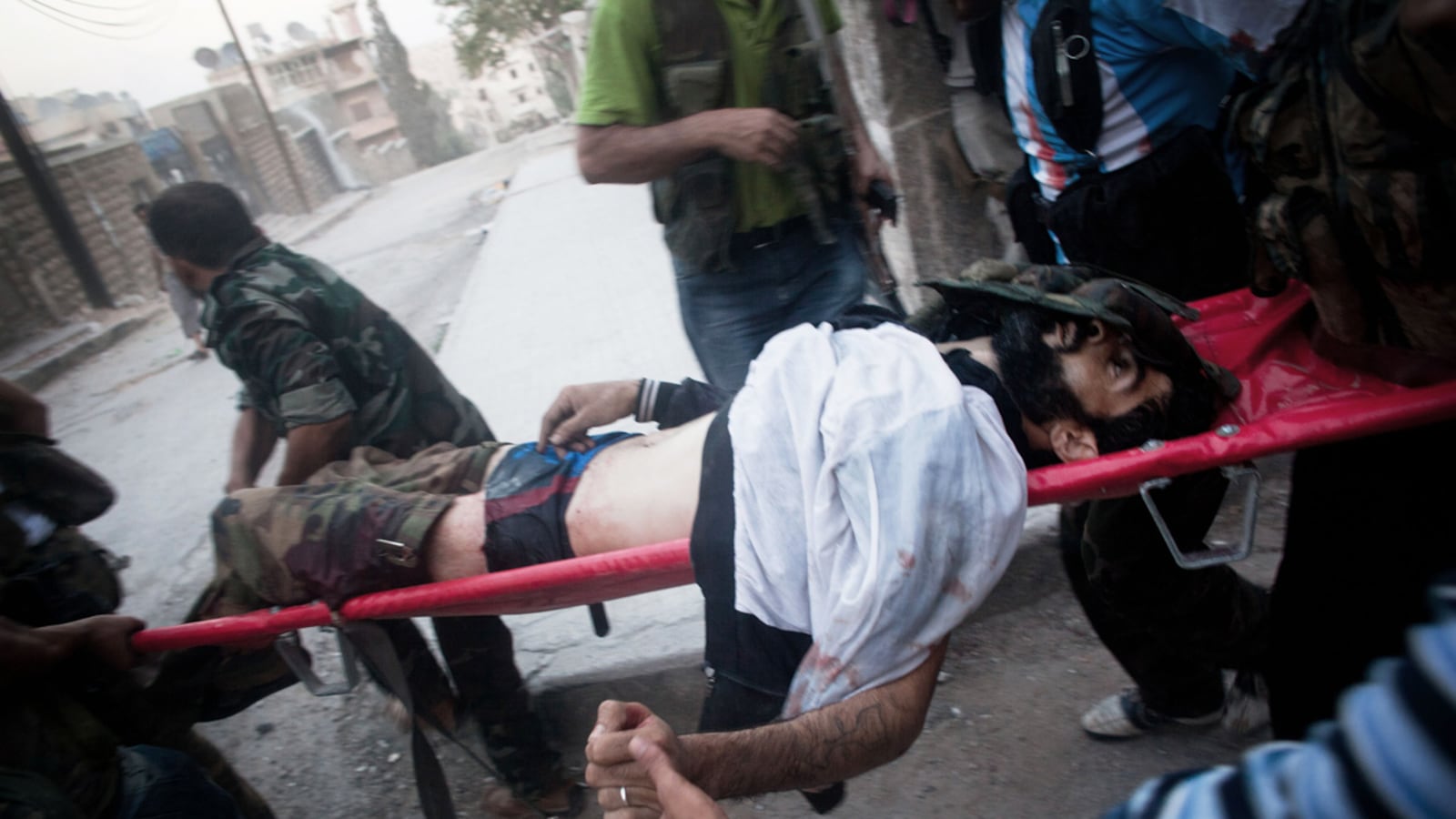Wajih Jouma fled Aleppo last month, believing a humanitarian disaster was imminent. As head of the city’s medical association, he’d watched Aleppo deteriorate rapidly since heavy fighting took hold in July. The regime had turned its artillery and warplanes on the city, neighborhoods had been demolished, and casualties had massed. And even beyond all the dead and wounded, Jouma found myriad causes for a doctor to be alarmed.
Uncollected garbage sweltered in the streets, filled with potential for infection and disease. The threat was in the rubble too, where sewage leaked and untold toxins were unearthed. The regular health problems facing the people of Syria’s largest city, meanwhile, were increasingly left unaddressed. Aleppo’s medical facilities, Jouma said, had been “almost paralyzed.” He worried over everything from people suffering heart attacks in response to the shelling to children’s vaccinations being missed.
“There are people with heart problems, kidney failure, diabetes, cancer—even deliveries. If I needed a crib for a newborn baby, it would be impossible to find one right now,” Jouma said in a recent interview in Gaziantep, a Turkish city near the border with Syria. “Everyone has a medical issue, and it’s impossible for us to do our jobs.”
And that was before one of city’s main water lines was hit.
Over the weekend, the ongoing fighting reportedly burst a water pipe that serves hundreds of thousands of residents, sending water gushing down streets and putting the supply for much of the city at risk. Though the extent of the problem remains unclear, one prominent opposition leader, Ausama Monajed, warned that the incident posed the risk of “a looming humanitarian disaster.” And Jouma saw Aleppo’s medical emergency pushing closer than ever to a breaking point. “We can’t talk about steps anymore,” Jouma says now. “We’re at the last step. This is almost the end.”
As the uprising against Syrian President Bashar al-Assad grinds through its 18th month, the conflict in Syria is still intensifying. More than 26,000 lives have been lost to date, according to the Syrian Observatory for Human Rights, while the U.N. refugee agency has reported that more than 100,000 people fled the country in August alone. Another 1.2 million have been internally displaced. As the havoc mounts, calls have increased for humanitarian assistance—on Friday the United Nations ramped up its appeal for aid money for Syria by nearly 100 percent.

Aleppo remains a focal point, as both sides appear to be locked down for a bitter fight. On Sunday bombing from the regime’s warplanes was again reported to have killed civilians. As the violence mounts, activists and aid workers are expressing despair at their inability to ease the suffering of residents struggling to go about their daily lives. “They have no food and no water,” says the observatory’s Sipan Hassan. “And because of the heavy shelling, in many areas there’s no way to help people or to get them medical attention, even for simple things.”
As Niazi Habash, a doctor and human-rights worker who fled Aleppo recently, puts it: “You have airstrikes every day that don’t differentiate between electricity or water or hospitals or civilians.”
Many of Aleppo’s residents have fled. Those who remain are living through excruciatingly uncertain times. “We have refugees actually migrating from one street to another in Aleppo, and we have others who leave the city from the suburbs, and we have people who leave the suburbs to go sit on the border,” says Ghassan Yasin, a veteran activist from the city. “It’s a disaster. Aleppo is being bombed every day. There’s not one street that’s not being bombed.”
The nearest border to Aleppo is with Turkey, which has closed it to refugees as it scrambles to construct new camps to accommodate them.
Even basic necessities have become an issue, with regular shortages in food, electricity, and water. Human Rights Watch recently lambasted regime forces for having “dropped bombs and fired artillery at or near at least 10 bakeries in Aleppo province over the past three weeks, killing and maiming scores of civilians who were waiting for bread.”
Some doctors in Aleppo, meanwhile, say they’re feeling increasingly desperate as they work to stem the humanitarian tide.
Mossab Breij, a general surgeon who has been assisting with medical relief in the city, says he attempted to visit a field hospital Saturday to take orders for supplies. As he approached, part of the hospital was destroyed in a blast, sending people scrambling to relocate the wounded with their cars. “There was not one ambulance—they were afraid to use ambulances because they thought they might be targeted,” he says. “Human life is impossible right now in Aleppo. Everything is impossible.”






